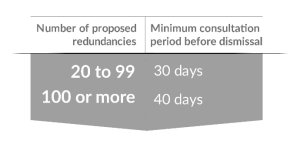What are the legal considerations when moving your business premises?
Relocating a business will present a multitude of questions for consideration. To best equip yourself, and in order to complete the move successfully, it is important that you are prepared, organised and have the relevant knowledge at your disposal. These facts will aid in the smooth running of the process.
When relocating your business, there are additional aspects to consider than one would face in a usual home move. For example, when moving a medical property to a new location, medical records need to be transported in a secure manner that would not result in patient details being lost, stolen, replicated or viewed by an unauthorised member of staff.
Key Considerations
Giving notice of relocation & Redundancy
The given period as stated on GOV.UK for informing employees of redundancy is dependent on the number of staff likely to be affected.
One of the first considerations for business owners should be the potential effect the dismissal of staff could have on their business. If too many core members or a high quantity of staff were to leave rather than relocate; owners may see a performance drop, or the business may flounder.
By law, business owners are required to notify the Secretary of State if twenty or more employees are to be made redundant.
Notification
 Employers are also required to notify RPS (Redundancy Payment Service); the deadline for which is dependent on how many job losses the move will incur.
Employers are also required to notify RPS (Redundancy Payment Service); the deadline for which is dependent on how many job losses the move will incur.
Consultation
 Another requirement that needs to be fulfilled is the consultation period. During this time, those in high managerial roles will discuss with the employee why the employee is being made redundant, or if there are any alternatives to this happening. There is a set amount of days that has to pass before any employees can be formally dismissed.
Another requirement that needs to be fulfilled is the consultation period. During this time, those in high managerial roles will discuss with the employee why the employee is being made redundant, or if there are any alternatives to this happening. There is a set amount of days that has to pass before any employees can be formally dismissed.
Insurance
Insurance is essential when relocating a business as a variety of aspects need to be covered. Goods in transit is a given; however, it is important that scenarios that are beyond your control are also covered, such as unscheduled delays which could be detrimental to the business. Reviewing your existing plan is also advisable.
Insurance is essential when relocating a business as a variety of aspects need to be covered. Goods in transit is a given; however, it is important that scenarios that are beyond your control are also covered, such as unscheduled delays which could be detrimental to the business. Reviewing your existing plan is also advisable.
As stated by the Association of British Insurers, ‘by law, your insurance must cover at least £5 million but, in practice, most policies offer at least £10 million. You can be fined up to £2,500 for each day that you do not have appropriate insurance.’ For more information, please contact one of our friendly advisors who will guide you through the process.
For more information, please contact one of the friendly advisors at Park Insurance who will guide you through the process.
Licenses
Ensure that your business has applied for the relevant license related to commercial activities.
Office safety checks
There are a number of safety-related checks business owners need to carry out by law.
Fire: A fire safety drill should be performed in the first week when the staff return to work at the new premises.
More information on fire safety guidelines can be sourced on GOV.UK.
Lockdown procedures: For D1 properties (medical practises and schools etc.), managers should review their lockdown procedures. These are plans put in place in case of a security breach.
As noted by the Central Bedfordshire Council, such threats may include:
- A community risk, for example, terror attacks
- An intruder or dangerous person
- A reported local health risks such as air pollution
- Fire
- Dangerous animals on the loose
More information on safety procedures, guidelines go to GOV.UK.
Moving in hazards: There are many potential hazards when moving into a new business location. Ensure that the space is free from clutter, as injuries are often sustained when employees trip or slip on clutter. Unpacking also poses a risk as items may have shattered in the move. Employees often attempt to substitute scissors for other sharp implements and this could cause a serious injury.
Environmental factors
UK businesses are required to adhere to environmental regulations protecting the welfare of both the natural surroundings and of the business’ staff. These may include:
- Insulation and ventilation
- Cleanliness of waste products
- Condition of floors and traffic routes
- Doors and gates
- Drinking water
- Escalators and moving walkways
- Falls or falling objects
- Maintenance of the workplace, equipment, devices and systems
- Recycling practises
- Temperature in indoor workplaces
- The optimisation of natural light
- Windows, skylights, and ventilators & the ability to clean windows, etc. safely
All properties are required to provide reasonable disabled access on a basis of request and need. For more information, FIH offer information and advice on disabled access. As stated by the NHBC (National House Building Council), important points include:
- Providing disabled car parking spaces
- Including ramps for entering and exiting the premises
- Ensuring the width of doorways are wide enough for wheelchair users
- Provision of disabled toilets (unisex is advised in case a carer is not of the same gender to the person requiring assistance)
- Visible signs
- Door handles at an accessible height
- Make sure that staff know how to aid the disabled in case of fire or emergency
Written by: Rachel Barton – Deputy Editor for Savoy Stewart.

